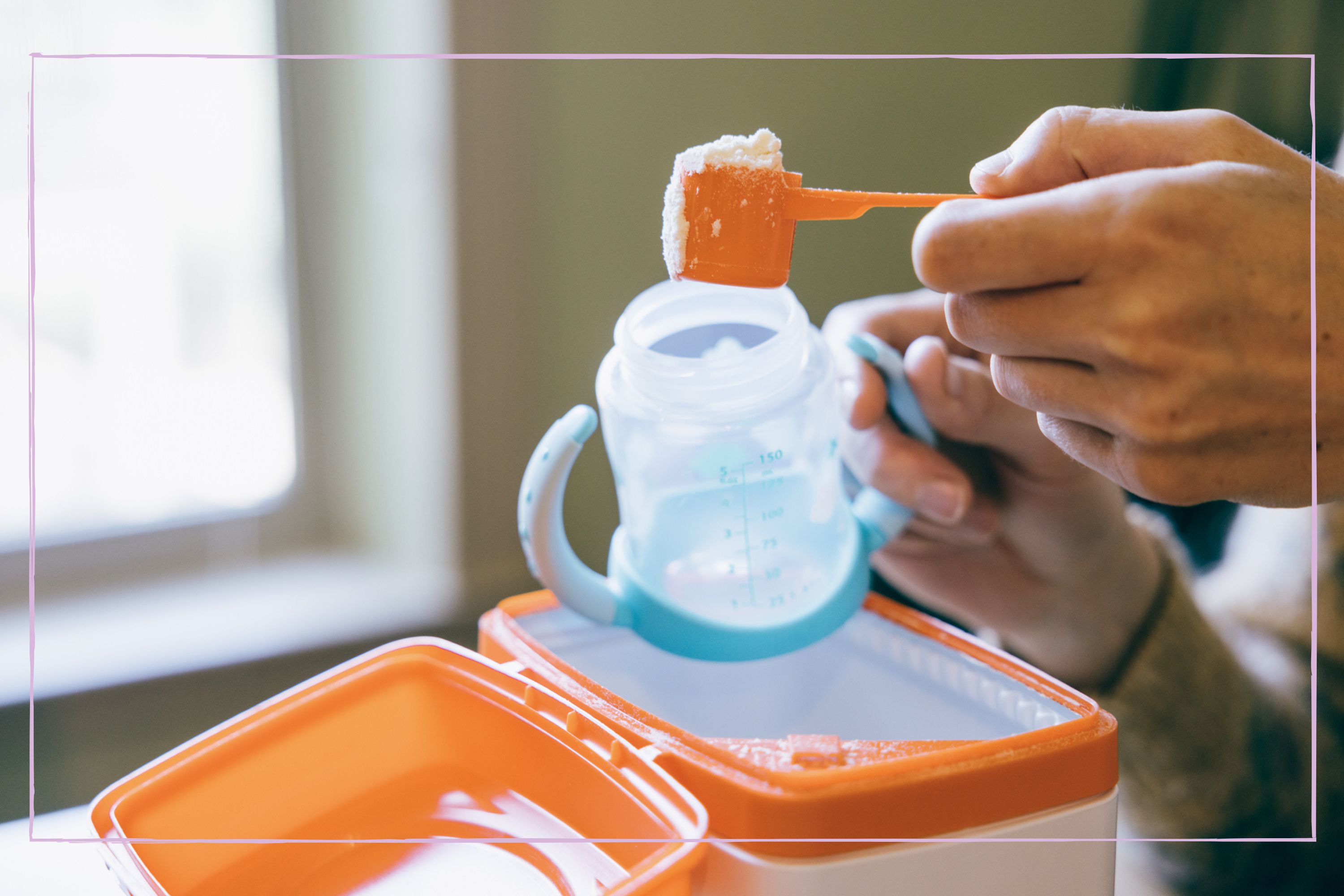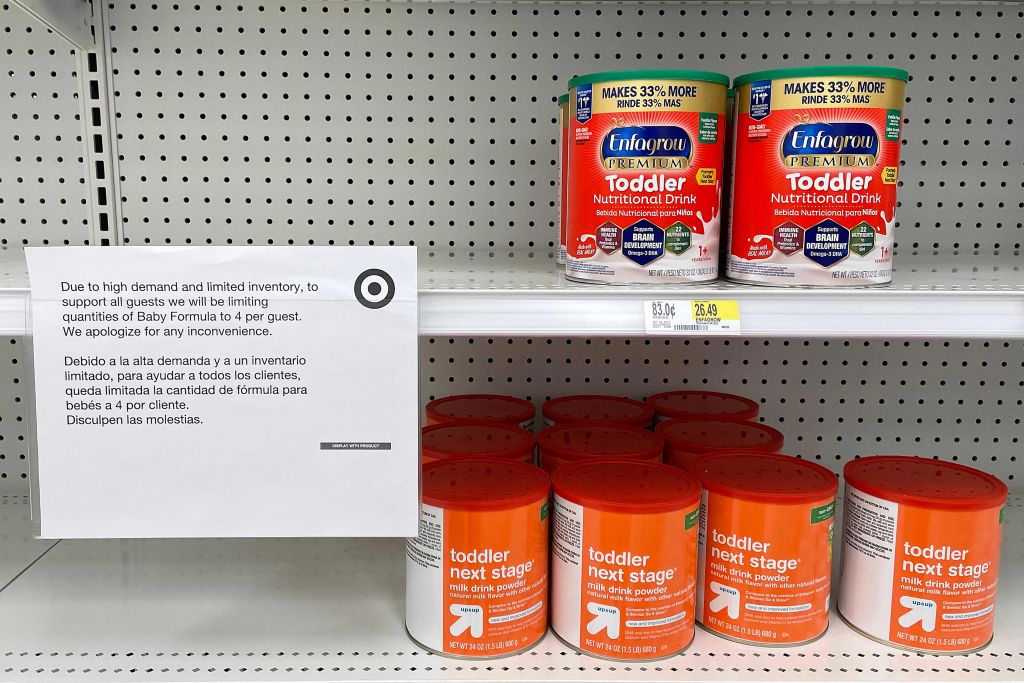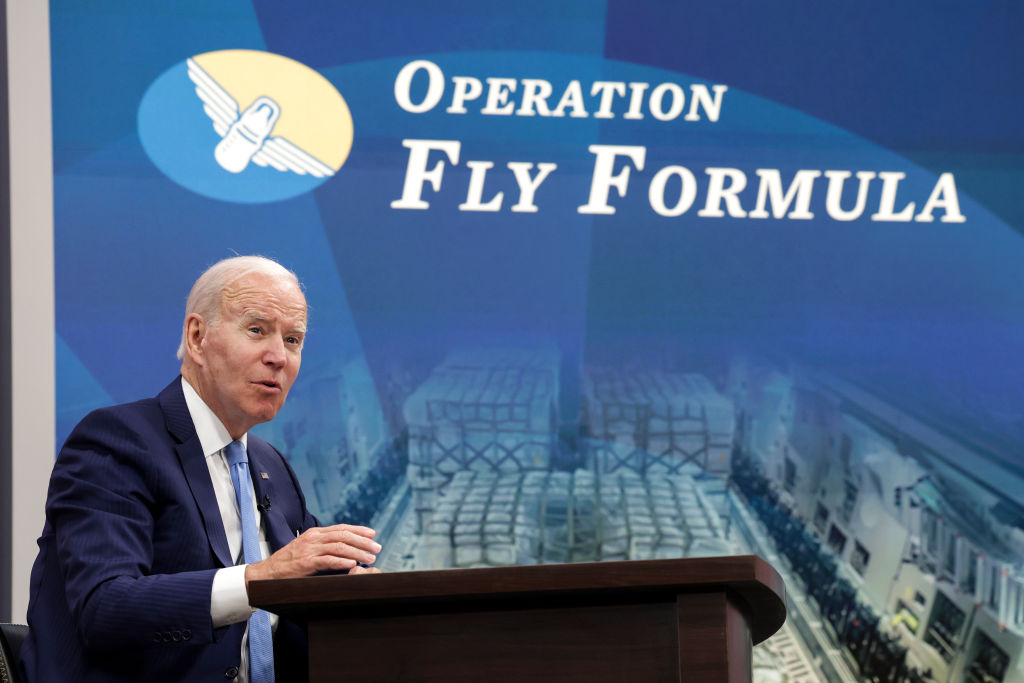Why is there still a baby formula shortage and when will it end?
All the latest information


We explain why there's still a baby formula shortage raging on in America - and how the whole crisis began.
Raising a tiny human and being responsible for their welfare is stress enough for most parents. But in America, mums and dads have had the recent added worries of tracking down 'fuel' for their infants, based on a baby formula shortage that has impacted families for over a year now.
According to the Centers for Disease Control and Prevention (CDC), 1 in 4 American parents breastfeed their child in the first six months, suggesting the majority are reliant on baby formula - a newborn essential - to provide their infant's nutrition. Last year, a combination of baby formula recalls and manufacturing issues led to nationwide supply chain issues that suppliers are still trying to rectify. Here, we've explained why the baby formula shortage is still ongoing and what's being done to solve it.
Why is there still a baby formula shortage in the US?
Whilst manufacturers are working hard to replenish stock, supplies of baby formula are still yet to return to normal levels following the increased demand in May and June last year. This is why the baby formula shortage is still ongoing.
Robert Cleveland, senior vice president in North America and Europe of Reckitt Benckiser - who produce baby formula Enfamil - told Reuters that he expects the shortage to continue throughout spring. "I suspect that will persist to some degree until the spring resets," he said, reassuring that: "There is much more volume on shelves than a few months ago, and enough to feed America’s babies."

Jimmy Chen, associate professor of analytics and operations management at Bucknell University, explained why the shortage continues despite improved stock levels.
"While supply has increased, so has demand," Chen told The 19th. "Similar to toilet paper, infant formula has no substitute. So the baby formula is yet another perfect product to trigger panic buying amid shortages.
GoodtoKnow Newsletter
Parenting advice, hot topics, best buys and family finance tips delivered straight to your inbox.
"Unsure of a sustainable future formula supply, parents who emphatically fear the worst will overfill their cupboards with the products for fear of running out."
In case you’re keeping score, yes this is still a problem. pic.twitter.com/d6yAjySeJ7April 18, 2023
How did the baby formula shortage start?
The baby formula shortage began in late February 2022 when Abbott Laboratories' manufactoring plant in Sturgis, Michingan was forced to closed down for several months. At the time, Abbott’s baby formula was the biggest manufacturer in the market, accounting for 40% of the nation’s supply. The Sturgis plant was also the largest formula production factory in America.
The plant closed after an FDA inspection found Cronobacter sakazakii bacteria - which can be deadly to infants - on site. The brand's Similac, Alimentum and EleCare powdered infant formulas made at the plant were subsequently recalled. This product recall, coupled with the plant's closure, ultimately led to supply chain issues and a shortage of baby formula available on superstore shelves.
The crisis particularly affected poorer families in America, with Abbott providing around half of the formula needed for the US government's WIC program - which helps low-income women, infants and children. With a shortage of baby formula on shelves, these families were left desperately searching for alternative products, which were already being snapped up by other mothers in need of formula.
Product data firm Datasembly recorded that at the start of May 2022, 43% of baby formula was out of stock at retailers. Supermarkets like Target and Walgreens Boots were forced to limit sales, restricting shoppers on how much baby formula they could purchase.
The US government stepped in during mid-May, with the Biden administration invoking the Defense Production Act which put pressure on suppliers of formula ingredients to prioritize delivery to formula makers.
In June, Operation Fly Formula was additionally launched, which saw American Airlines fly in imported baby formula from countries like Mexico, Chile, Ireland, Scotland and the Netherlands.

Abbott's Michigan plant re-opened on June 4 after the months-long shutdown, but was forced to close again for a further three weeks, starting June 16, after damage from thunderstorms and heavy rain. Production resumed on July 1, 2022.
During Abbott's production disruption, national and international manufacturers rallied to increase their own baby formula production to help address the shortage. British company Reckitt Benckiser upped their production of Enfamil by about 30% and reduced the time it takes to get product to shelves by nearly half, an executive told Reuters.
Enfamil has since become the biggest baby formula brand in the market. Though in February 2023, the company voluntarily recalled just under 150,000 cans of baby formula over concerns that it may have been contanimated with the same deadly bacteria that led to the Abbott Labarotories' plant closure.
In a statement, Reckitt confirmed that whilst no cans tested positive for the bacteria, they feared potential cross-contamination. The affected cans have batch numbers ZL2HZF and ZL2HZZ, or a UPC code of 300871214415 on the bottom of the can.
"We are committed to the highest level of quality and safety and it is for this reason that we have taken this extraordinary measure,' the company wrote in a release. "The batches in question tested negative for Cronobacter and other bacteria and this is an isolated situation. After a thorough investigation, we have identified the root cause, which was linked to a material from a third party.
"We have taken all appropriate corrective actions, including no longer sourcing this material from the supplier."
A post shared by Enfamil™ 🍼 (@enfamil)
A photo posted by on
When will the baby formula shortage end?
There's no specified end date for the baby formula shortage. However, a White House official has said that 2023 production is higher than in 2021.
"We are in close touch with top retailers who continue to have supplies of formula on hand, but may still lack all the sizes and varieties they once carried," the official said told The Guardian.
The source added that imported baby formula on shelves has helped ease the problem, thanks to foreign brands like Danone's Aptamil and Bellamy's Organic now widely available.
In December 2022, data firm IRI shared that baby formula stock has continued to improve, with stock levels close to 86%. Pre-recall stock levels of formula were previously steady at 88–90%.
Despite this information, families are still struggling to get their hands on baby formula. An IRI survey from January 2023 found that a third of families with an infant younger than 1 said they had had trouble getting formula sometime in the past week. Over half said that they had less than a week’s supply on hand.
Baby formula shortage - helpful resources
- CDC helpline (800-232-4636) - The CDC helpline aids people in locating formula near them.
- Baby Formula Search and Swap: Parents Helping Parents – A Facebook group with nationwide members who post details of stock levels and baby formula availability.
- Find My Baby Formula (Apple app/Google Play app) - an app that monitors formula stock and sends notifications to users when available.
Related features:
- Pepper shortage 2023: Why are supermarkets running out of peppers?
- Is there a toilet roll shortage in the UK?
- Calpol shortage 2023: Why the medicine is in short supply
- Why is there a Sriracha shortage? Here's what we know
- Coffee Mate shortage 2023: Why are supermarkets running out of Coffee Mate?
Video of the Week

Emily Stedman is the former Features Editor for GoodTo covering all things TV, entertainment, royal, lifestyle, health and wellbeing. Boasting an encyclopaedic knowledge on all things TV, celebrity and royals, career highlights include working at HELLO! Magazine and as a royal researcher to Diana biographer Andrew Morton on his book Meghan: A Hollywood Princess. In her spare time, Emily can be found eating her way around London, swimming at her local Lido or curled up on the sofa binging the next best Netflix show.